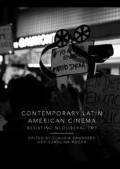Abstract
This chapter deals with Maximiliano Schonfeld’s work with and about the rurally based Volga German community in the Argentine province, Entre Ríos. The films of the young Argentine director concern themes of social marginality and neoliberal critique in a rural setting. Utilizing documentary and fictional modes, open narrative structures and enticing visuals, they draw pictures of a community in crisis. Consumer culture has begun shaping the desires of younger Volga Germans, while a concentration of capital in the agricultural sector threatens the existence of small-scale family-owned businesses. With reference to the shorts Esnorquel (2006), Entreluces (2006) and the feature film Germania (2012), the author argues that Schonfeld’s filmmaking is an act of resistance to the loss of community-based living and working structures in rural environments.
Access this chapter
Tax calculation will be finalised at checkout
Purchases are for personal use only
Works Cited
Aguilar, Gonzalo. 2008. New Argentine Film. Other Worlds. Translated by Sarah Ann Wells. New York: Palgrave Macmillan.
Andermann, Jens. 2013. “December’s Other Scene. New Argentine Cinema and the Politics of 2001.” In New Argentine and Brazilian Cinema: Reality Effects, edited by Jens Andermann and Álvaro Fernández Bravo, 157–72. New York: Palgrave Macmillan.
Andermann, Jens. 2014. “Exhausted Landscapes: Reframing the Rural in Recent Argentine and Brazilian Films.” Cinema Journal 53 (2): 50–70.
Battle, Diego. 2013. “Germania.” La Nacion, February 21, 2013.
Bernades, Horacio. 2013. “Llega el crepúsculo a una granja litoraleña.” Página 12, February 21, 2013. https://www.pagina12.com.ar/diario/suplementos/espectaculos/5-27868-2013-02-21.html.
Boetti, Ezequiel. 2013. “El viaje inminente y la desintegración.” Página 12, February 19, 2013.
Brodersen, Diego. 2016. “La diosa blanca.” Página 12, June 26, 2016. https://www.pagina12.com.ar/diario/suplementos/radar/9-11599-2016-06-26.html.
Chavero, Rodrigo. 2013. “Germania: idiosincrasia teutona en escenario local.” El Espectador Avezado, February 20, 2013.
Dieleke, Edgardo. 2013. “The Return of the Natural: Landscape, Nature and the Place of Fiction.” In New Argentine and Brazilian Cinema. Reality Effects, edited by Jens Andermann and Álvaro Fernández Bravo, 59–71. New York: Palgrave Macmillan.
Duarte, Ezequiel Iván. 2014. “Parricidios.” El Zapato de Herzog, March 4, 2014. https://elzapatodeherzog.wordpress.com/2014/04/03/parricidios/blog_de_cine.
Fernández Armesto, Verónica. 2000. “Los alemanes del Volga en las colonias de Entre Ríos.” Todo es Historia 398: 60–72.
Gattás Vargas, Maia. 2017. “Un cine-monstruo para un territorio monstruoso. Un análisis de dos audiovisuales sobre la Patagonia chilena.” LaFuga 20. http://www.lafuga.cl/un-cine-monstruo-para-un-territorio-monstruoso/849.
Gronda, Rosa. 2013. “En vísperas de la disolución.” El Litoral, March 12, 2013. http://www.ellitoral.com/index.php/diarios/2013/03/12/escenariosysociedad/SOCI-06.html.
Haase, Jenny, and Kathrin Sartingen. 2012. “Filmische Patagonienreisen. Kontinentale, nationale und regionale Bewegungen durch den argentinischen Süden.” In Filme in Argentinien. Argentine Cinema, edited by Daniela Ingruber and Ursula Prutsch, 123–45. Wien and Berlin: LIT Verlag.
Harvey, David. 2005. A Brief History of Neoliberalism. Oxford: Oxford University Press.
Kay, Cristóbal. 2004. “Rural Livelihoods and Peasant Futures.” In Latin America Transformed: Globalization and Modernity, edited by Robert N. Gwynne and Cristóbal Kay, 232–50. London and New York: Routledge.
Kay, Cristóbal. 2015. “The Agrarian Question and the Neoliberal Rural Transformation in Latin America.” European Review of Latin American and Caribbean Studies 100: 73–83.
Koehler, Robert. 2012. “Germania.” Variety, April 29, 2012. http://variety.com/2012/film/reviews/germania-1117947469/.
Koepnick, Lutz. 2013. “German Art Cinema Now.” German Studies Review 36 (3): 651–60.
Motta, Renata. 2016. Social Mobilization, Global Capitalism and Struggles Over Food: A Comparative Study of Social Movements. London and New York: Routledge.
Newell, Peter. 2009. “Bio-Hegemony: The Political Economy of Agricultural Biotechnology in Argentina.” Journal of Latin American Studies 41 (1): 27–57.
Oubiña, David. 2013. “Footprints: Risks and Challenges of Contemporary Argentine Cinema.” In New Argentine and Brazilian Cinema: Reality Effects, edited by Jens Andermann and Álvaro Fernández Bravo, 31–41. New York: Palgrave Macmillan.
Page, Joanna. 2009. Crisis and Capitalism in Contemporary Argentine Cinema. Durham and London: Duke University Press.
Pengue, Walter. 2004. “A Short History of Farming in Latin America.” Report for GRAN, April. Accessed November 10, 2017. https://www.grain.org/article/entries/413-a-short-history-of-farming-in-latin-america.
Rocha, Carolina. 2012. “From the Margins to the Center: Daniel Burman.” In Filme in Argentinien—Argentine Cinema, edited by Daniela Ingruber and Ursula Prutsch, 147–62. Wien: LIT Verlag.
Schejtman, Natali. 2013. “Vida de este pueblo.” Página 12, February 17, 2013. https://www.pagina12.com.ar/diario/suplementos/radar/9-8613-2013-02-17.html.
Scholz, Pablo O. 2013. “Germania.” Clarín.com, February 22, 2013. https://www.clarin.com/espectaculos/cine/Critica_0_HJLuv65iw7e.html.
Schroeder Rodríguez, Paul A. 2016. A Comparative History of Latin American Cinema. Berkeley: University of California Press.
Sendros, Paraná. 2013. “Cine de sugerencias para contemplativos.” Ámbito Financiero, February 21, 2013.
Svampa, Maristella. 2005. La sociedad excluyente. La Argentina bajo el signo del neoliberalismo. Buenos Aires: Alfaguara.
Verardi, Malena. 2009. “El nuevo cine argentino. Clave de lectura de una época.” In Una década de nuevo cine argentino (1995–2005), edited by Ignacio Amatriain, 171–89. Buenos Aires: CICCUS.
Acknowledgements
I would like to thank Alejandro Areal Vélez for many fruitful discussions about this subject and for facilitating contact with director Maximiliano Schonfeld .
Author information
Authors and Affiliations
Corresponding author
Editor information
Editors and Affiliations
Rights and permissions
Copyright information
© 2018 The Author(s)
About this chapter
Cite this chapter
Sandberg, C. (2018). Maximiliano Schonfeld’s Films of the Volga Germans in Entre Ríos: About the Neoliberal Devil in Argentine Cinema. In: Sandberg, C., Rocha, C. (eds) Contemporary Latin American Cinema. Palgrave Macmillan, Cham. https://doi.org/10.1007/978-3-319-77010-9_13
Download citation
DOI: https://doi.org/10.1007/978-3-319-77010-9_13
Published:
Publisher Name: Palgrave Macmillan, Cham
Print ISBN: 978-3-319-77009-3
Online ISBN: 978-3-319-77010-9
eBook Packages: Literature, Cultural and Media StudiesLiterature, Cultural and Media Studies (R0)

